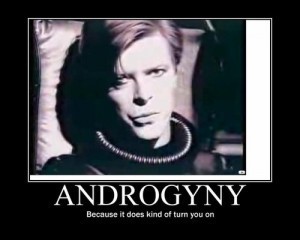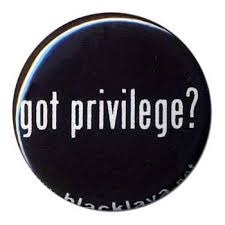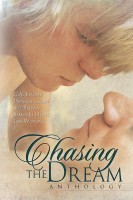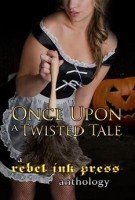Fierce Dolan's Blog: Writing Utopia, One Word at a Time, page 21
February 13, 2012
Relationships for the Gender-Ambiguous
The title could as easily be "Gender for the Relationship-Ambiguous. Gender is a fluid thing to me, but then so are relationships. Within that observation, put the two together and certain curious details emerge.
One specific stereotype of relationships has bothered me from Day 1 of Adult Relations. Before I get to that, let me clarify a few things: I've never maintained a long romantic relationship with a woman, as in shared bills and whatnot. My experience from the long haul standpoint has been with men. That said, even with my limited range of biosex longterm relationship, dynamics are dynamics in my experience, and certain archetypal, if not energetic, traits override the bits.

Yin/Yang
I find this realm's complementary life force constructs–masculine and feminine–apply regardless of what the biosex or relationship format are. Despite the perceived limitations of gender, orientation, or relationship style (because yes, some people are in triads, quads, of mixed bio/gender queer, etc), the polarities of yin/yang still exist. Thus, the social and behavioural components of those opposites still exist, as well.
In short, yang is the masculine or active principle. It does things, initiates creation. Yin is the feminine principle, which processes things to give them meaning. Yin forms the basis from which we determine how we move forward from old things for Yang to do more new things. Yang plants the seed; Yin fosters it to manifestation. I'm going to assume that I'm preaching to the choir, on that note. There are plenty of places to read about yin and yang.
With that understanding, masculine and feminine are not exclusive from each other, or from the other primordial components of how we form ourselves as humans in this realm. Rather, they are complements existing in all things–we all embody both qualities. Each quality comes forward as its needed through life.
Having established that, the stereotype I'm speaking of is this dynamic in which the feminine often expects the masculine to change. We most encounter this stereotype in common discourse as "women expect men to change." That phrasing doesn't really do it justice, though. I'll get to that bit in a minute. This little gem gets a lot of play from Cosmo and the grist that attempts to inform us of what our bioidentities, and to some degree genders, should expect in relationships, and none of it is flattering for anyone.
This idea serves to create a culture in which women set out to demolish men and men expect constant confrontation. It plants the seed that not only do women expect that men will change once in a relationship, but that men should change, and it is the woman's role to change them. Thus, the relationship becomes centered around a projected sense of reality rather than the reality that is. That faulty perspective can't sustain, despite that our society supports it.
What bugs me as much as this stereotype is its bed fellow that no one talks about. I opened dialogue on this some years ago with fairly sexually and gender pioneering peers, thus feel fairly confident in originating it here: the masculine often expects the feminine to stay the same. I see it most often in men's expectations that women should remain the minxy lasses they were upon meeting their committed mates, ever vivacious, energetic, orgasmic, and… pretty.
An equally problematic expectation as the former, it sets up the projection that how a woman is at the inception of commitment through combined household, children, taxes, aging, should be how she remains. Deeper implications of these are that a woman's needs should never evolve, her wisdom should never dominate, and her body should not show wear.
In the culturally accepted setup, everyone is hetero and in the officially sanctioned style of union, and the language used to describe these stereotypes reflects that. The reality is, I watch these dynamics at work in almost every relationship at some point–homosexual dyads, bi-poly triads, you name it. When you strip away all of the conventionally applied labels, another pattern regarding change and expectations emerges.
In my more sacred line of work dynamics become visible to me from a higher angle, one in which there are no labels. The most common one that I see in relationships is one partner requests a behavioural change in the other partner, and when that partner demonstrates changed behaviour, the inquiring partner begins acting out the unwanted behaviour.
It's miraculous that a person honors a request for change from another, let alone actually manifests the change. In cases where this happens, it speaks more about divine gender polarities having a greater influence than we're consciously aware, more so than bioidentity, gender, or social projections.
 Think about it:
Think about it:
yang = action
yin = process
We're all made up of both yin and yang. Which we choose to act out depends on the needs of our lives at the moment. Sometimes we need to be the initiator of action, sometimes we need to be the process defining the acts' significance. Factor into relationships the social construct of gender, bio-identity, and the ever-shifting divine polarities we all carry and you're in for an interesting ride.
I think the moral of the story is that we have to stay in tune with these greater polarities, focusing on them as much or more than our prescribed views of sexuality and relationships. Given that, it's our job to play out these roles between us–for there to be times when we demand change from lovers (or ourselves) and when we demand consistency. We are supposed to function within that broad range, not just part of it. Falling into the trap of always demanding and unspoken expectations is dwelling on shadow aspects of our own divinity. We are supposed to have this tension between us and within ourselves. That is the creative process at work. It is what motivates us to get off our asses and change things.
My question is, can we do embody this creative process and divine polarities without all the backbiting and criticism of biosex and gender expectations? Can we bless the process and in doing so bless our lovers, friends, and selves? And in blessing the process, can we carry it out with a little less drama?










February 8, 2012
Squicks, Breaking Points, and Boundaries
What do limits, squicks, and slash fanfic have in common? It's all in my guest post "Squicks, Breaking Points, and Boundaries" on D Alexx Miller's blog! Comment there to let me know how you lovely erotica writers handle pushing your comfort zones…










November 30, 2011
The Victim Mindset Behind Extreme Idioms and Luxury Language
 I'm going out on a limb here. Get it? I'm not literally climbing out on the branch of a tree, but figuratively, I'm taking liberty with canon use of the English language and making it my bitch. I'm shaping the words to mean what I want them to mean by my personal situation and context, even if they don't really mean that in the language proper, or to anyone else. Usually idioms are a word, or a phrase whose words in isolated use don't and can't mean what they say. Idioms are figurative.
I'm going out on a limb here. Get it? I'm not literally climbing out on the branch of a tree, but figuratively, I'm taking liberty with canon use of the English language and making it my bitch. I'm shaping the words to mean what I want them to mean by my personal situation and context, even if they don't really mean that in the language proper, or to anyone else. Usually idioms are a word, or a phrase whose words in isolated use don't and can't mean what they say. Idioms are figurative.
What I'm getting at is, I find I'm really bothered by the common use of extreme idioms. It's part of what I consider "luxury language," words people say despite their privileged status preventing the circumstances of those words from being true for them. For instance, people say all the time, "I'm starving." Really? Are you really starving, or are you just very hungry? There's a difference between those two things. 'Being very hungry' means you really need something to eat, soon. 'Starving' means that you need something to eat soon and there's no food to meet that need, and likely there won't be any. Follow me now?
I say "luxury" because there are starving people in the world. Hell, there are probably starving people in my city. But if it's lunchtime and you're walking into the bagel joint, you're not starving. You're impatient, and maybe have low blood sugar, but clearly you're going to eat shortly.
Another I hear this time of year: "I'm freezing to death." That one's a double whammy. Again, to freeze implies that you are cold beyond your capability to become properly warmed again. Most of us will never in our lives come close to freezing. Yet, it happens all the time. Homeless people freeze until they die in urban cities every winter. Impoverished people in cold climates freeze. People with coats, hats, and gloves walking from their car to a building don't freeze. They're just very cold until they reach the next warm point. The discerning factor is, they will reach the next warm point.
Here's a great new trendy word: rape, as in "Dude, we got raped in that game last night." The phrase intends to reflect a severely unfortunate loss of something–usually a ballgame, wiping in a raid (as in Warcraft which would be an "epic fail"), or being harshly judged on some effort. Are any of these the "unlawful compelling of a person through physical force or duress to have sexual intercourse?" [1] No. Are they "an act of plunder, violent seizure, or abuse; despoliation; violation?" [4] No. Why aren't they? Well, obviously because in these uses no one was forced into sexual activity,and because no matter how disappointed you may feel that your team lost or you didn't get the reward you expected, you will ultimately walk away from this engagement emotionally, psychologically, physically, and spiritually fine. No post-trauma here.
Others of interest: "We got lynched," and the very timely "I'm broke." Were you really put to death by hanging by a mob with no legal authority? Because historically a lot of people were and many still are, and they're not walking around complaining about it, today. They're dead. And with our economy in the shitter, a lot of people really are broke right now. Just to reiterate, though, to be broke means that you have no money and means to acquire more are severely limited if nonexistent. Most of us are not that.
Why does it matter? Why am I being crazy over the language people choose to express themselves? It bothers me because I think it demonstrates a separation between the privileged and people who really are enduring awful states of being. The whole reason we get to speak with exaggeration is privilege. Privilege allows us to see ourselves as victims when we aren't. Victim-speak disempowers us, as well as disrespects people who really are experiencing those states of being.
Is there an inherent threat in that? I guess that depends on what you believe. Does that make people who speak with such exaggeration bad people? Probably not. But does speaking with impeccably accurate language make us more aware of ourselves and how we fit into the world? I'd bet so. Does it make us better writers?… How can it not?










October 6, 2011
Sexy-Smart Storm Grant
Through a writer friend-of-a-friend-of-a-friend, a couple of years ago I met the lovely Storm Grant. She's a hard-working woman devoted to her craft, and her work shows it. Wonderfully adept across genres, she's a skilled sextress and daring literary provocateur. Don't misunderstand–Storm's stories aren't all sex and sweat. Rather, witty writing styled with urban, relatable characters and themes keeps her readers riveted. In short: she's sexy-smart.
Storm Grant describes herself as a writer of short and long tales with work spanning both genres and genders. Her stories offer titillation and merriment, and in a few cases, horror. She's published with MLR, Torquere, Phaze, Blood Bound Books, eXessica, Amber Quill, and now, Riptide Publishing.
Her current release due out at the end of the month from Riptide Publishing, SUCKS & BLOWS, is the epic (but short!) love story between a vampire and his dentist. Here's the blurb:

Sucks & Blows by Storm Grant
Deeply in debt to a loan shark, oversexed dentist Cary Drewel lives in fear of foreclosure and bodily harm. His new practice is missing one rather crucial element: patients. Which, terrifyingly enough, is the one thing his creditors also don't have.
Pierce Sharpe, a powerful vampire with a drinking problem—or, more accurately, a problem drinking—can't feed through the pain in his damaged eye teeth. In danger of losing his standing in the vampire community, Pierce seeks Cary's dental services. When Cary extracts his canines, Pierce must turn to other bodily fluids for sustenance.
Together, Cary and Pierce find a mutually pleasurable solution to both their problems. Turns out, though, there's more to this dentist-patient relationship than simple suction, and what began with raw hunger from each of them might just end in love.
I told you–sexy-smart. And here's a little tease:
Cary was just about to jerk off again when the electronic door chime squawked the first few bars of "Another One Bites the Dust."
He rushed out to the reception area. "Hello. Welcome to Drewel's Dentistry!" He hoped he didn't sound too anxious. And that his residual hard-on wasn't tenting his racy black dental smock.
That the visitor was tall and handsome, with a muscular build and chiseled cheekbones, did little to dampen Cary's arousal.
"I . . . I thaw your brothure." The man held out Cary's carefully crafted (but badly printed) flyer:
Grand Opening!
Drewel's Family Dental Clinic
~ Vampires Our Specialty ~
"You do vampireth?"
"Absolutely." Cary grinned. He'd included the vampire reference to show he was the dentist with a sense of humor. And also to attract the Twilight age group, which was ripe for expensive orthodontia.
"Hurths." The man pointed to his upper lip, red and swollen on either side of his sexy little cupid's bow.
"I can help you with your dental breakdown, Mr. . . ."
"Tharpe. Pierthe Tharpe."
"Nice to meet you, Mr. Sharpe. May I call you Pierce?"
"Thure." Pierce held out his hand.
"Call me Cary, then." Cary grasped the outstretched hand, surprised at how cold and shaky Pierce felt. This guy was in bad shape. He looked like death—if death were really cute, that is.
Storm is a board member of the Toronto chapter of the RWA, a member of the FF&P chapter, and a founding member of the Rainbow Romance Writers chapter. Her business degree has seen much use over the three decades she's spent working in marketing and administration. She lives in Toronto, Canada, with her husband, a miscellany of rescued pets, and a rather messy house.
Follow Storm's blog, Facebook, and Goodreads pages, and tweet her @StormGrant.










September 28, 2011
Dead Metaphors, Macabre Morphemes… Slaying the English Language
Yes, I'm a language Nazi, not because I know so much (though I do know a lot), but because language fascinates me enough that after years of writing recreationally and professionally I still take the time to study and attempt to get it right. What appalls me is the people who don't.
I love writing. I respect and I love it so much I don't consider writing a skill but a sense. I don't function the same without it. I don't perceive as clearly without it. As much as I love writing I thrill in the study of language. Language is the only math that has ever made sense to me. The function that unpacking it serves for me is that it helps me understand people, life. Where writing is a sense, studying language is more of a reflex, a primal instinct like communal grooming, the sort of behavioral not polite enough for the dinner table. I don't have to do it, but I want to stew in semantics, etymology, linguistics all the time. In my heart, I don't understand other writers who don't have that same exuberance for words or how they fit together, why they fit together the way they do, and how the meaning changes with the mere movement of an (Oxford) comma. As a professional writer, though, that kind of intellectual masturbation wouldn't serve me terribly well, as I'd never get anything done. Because writing is such a subjective and personal craft some things I can forgive in deliberate poor construction. As a native speaker in my natural habitat, though, carrying core knowledge of the English language into a single conversation un-does me. I hear commas in speech. I see the dangling participles branching off that diagram line connecting with the verb. Sometimes I get so lost in attempting to linguistically make sense of someone's sentence structure that I miss what s/he is actually saying.

Kid Glove
I'm great fun at parties.
I'm always amazed by how many native speakers don't know how to speak English. I should cut us all some slack, as it's a hard language to learn. Screw that. Structure and "colorless green ideas sleep furiously" aside, the thing that bothers me most in how we torment the language is that so often I can tell by the way people speak that they aren't saying what they think they are, which makes me wonder what their internal process was leading up to what actually came out of their mouths. My wonderfully well-rounded undergraduate writing degree taught me a few kernels that I've carried through twenty years of writing professionally, one of which is, "You can't break the rules until you've learned them."
The immature teenager in me hears that and says, "duh," but my angst-ridden artist screams, "WHATEVER." My time in school left me questioning that dogma, though I didn't totally ditch it. My love for sentence structure and bizarre colloquialisms wouldn't let me–until I'd gained enough experience in the industry, and with speaking adults. That rule solidified one of my constant commandments in writing and speaking: "If you don't know what a word means, don't write/say it."
To that end, one of my favorite studies in school was dead metaphors–phrases for which the imagery no longer applies to contemporary living; thus, its meaning is lost, er dead. There is some debate that as dead metaphors conform to the present that there is no such thing. The prescriptivist grammarian in me disagrees. For instance, take the phrase, "kid gloves," for which I often hear, "kit gloves." Kid gloves were made from the skin of a young goat, a kid, and were revered for their supple, refined softness. Thus, in lieu of more rigid, less conforming mitts, one handled delicate items with kid gloves.
Also there is one of my personal peeves, "moot point, " which in modern use means an irrelevant argument. Its origin was in medieval meets, or "moots," councils who gathered to settle government matters. I can't tell you how many people I hear say, "mute point." How does that even make sense? How do they hear the point?
Here's the thing that started this whole rant: I never thought I would encounter a metaphor that died within my own lifetime, nonetheless, it's happened. Recently, a friend used the phrase, "epic fail." In my circle of techno gamer geeks I would never have questioned the use of the phrase. However, I know as fact the person who used the phrase has never participated in an RPG in her life, which told me instantly that she didn't understand the sacred use of the holy phrase. Those of you who played D&D back in the day will recall rolling funky 20-sided dice to determine success or failure of a maneuver. Within that range is the possibility to succeed (slay the creature/gain the treasure), fail (trigger a trap while running for your life), or epic fail (trigger a trap that slays your whole party while running for your life). Now, the phrase is used to signify anything unsatisfactory. At its inception, there was a measurable quantification of fatal loss in its original meaning, for which even MMORPG players now don't seem to have a basis. In other words, in the world of critical hits forgetting your lunch isn't a *faceplant* epic fail.
Which leads me to my other favorite language bastardization–made up words. Some people call them slang, I like to call them macabre morphemes because I think they kill the language as much as dead metaphors. Morphemes are the smallest unit of a word that still makes semantic sense. What is referred to as "bound splinter morphemes," (I told you I'm a word geek) are oddly parsed together base words (morphemes) that have been accepted as words in their own right, such that former meaning of the individual bases is lost or overlooked. The outcome of this blend is the joined splinters become a morpheme–an accepted English word. I most often encounter them in marketing scenarios, in which a known word capitalizes on its established meaning while intending to recreate and sell something different, such as:
Croissan'wich
Bagelwich
Bageldog
McNuggets
Bubblicious
Craisins
Appletini
Then there are the descriptive titles one creates for oneself, serving the same marketing purpose:
Maxinista (skillful shoppers of TJ Maxx)
fashionista (fashion diva)
shamanista (ultimate girl shaman)
Finally, we have garden variety constructs so common that we don't question their suggestive or individual splinter values anymore:
blog
netiquette
WaterGate
mockumentary
docudrama
sexaholic
fantabulous
chillaxin'
fugly
I know, I know. Who the fuck do I think I am taking on the evolution of a language? I get that's the way language grows. I just wish that it would evolve intelligently from the rules, rather than in mind-numbing absence of them. And whoever wants to structurally and linguistically analyze this post I ask that you do so with a green pen.










September 20, 2011
A Risqué Read from CJ Roberts
In her debut novel Captive in the Dark, author CJ Roberts explores the world of pleasure slaves. Making a daring splash in the indie book scene, Captive is book one of The Dark Duet series. To exact revenge on the man who trafficked him as a child, Caleb must entrench himself in the hated underworld to find him. Only after he takes a young woman captive and becomes a slave owner himself can he truly strike back, though his fondness for her begins to affect his plans.

Captive in the Dark by CJ Roberts
Captive is Roberts' first book-length release, though she also authored a short story under the name "Jennifer Roberts." She has traveled the world and everywhere she goes is on the look out for the underculture.
Learn more about her work at her Official website. Find her on Twitter @authorcjroberts.










September 7, 2011
Steamy New Stories From SammyJo Hunt!!
Coming out of this hot summer, smoldering new releases have caught my attention that I'd like to share with my readers. Here and there will feature the work of fellow naughty authors, and I'd like to start with SammyJo Hunt. Born and raised in sunny Southern California, SammyJo currently resides in the Midwest. Growing up, she was an avid reader and romance novel enthusiast. Parlaying that love into writing, SammyJo has several small projects in the works, all leading to a glorious finish you're going to want to check out. Her next novel comes out this month from Rebel Ink Press, entitled Haunted by Obsession. It's a contemporary, m/m paranormal erotic ghost story and murder mystery. Enjoy a taste:
Aaron Michaels and Kurt Freeman-Michaels are musical celebrities. An openly gay couple living their dreams, the boys just celebrated their first year of wedded bliss. Feeling the need to escape and spend some time alone for a change, Aaron and Kurt take an impromptu trip up the coast of California. While they're away, the pair happens upon an elegant Victorian mansion that draws them both in. After falling in love with the property, an unexpected turn of events occurs which makes it possible for the boys to buy the house.
Gordon Inn has stood magnificent beside the ocean for the past 127 years, yet the house hides a dark secret within its walls. Rumors of an illicit affair and a century-old murder color the Inn's unique and troubled past.
Aaron and Kurt quickly learn there's more to the history of Gordon Inn than meets the eye. But many questions remain. Will the couple's lives be torn apart before they find the answers they seek? Who will come to their aid when they're left alone inside the solitude of their ancient home? And, will the boys be able to solve the mystery before more lives are lost?
 Another project SammyJo is proud to be part of is the anthology entitled Chasing the Dream, to be released via Silver Publishing on September 17th. The anthology also includes the efforts of Sue Brown and GA Hauser. This m/m compilation of erotic stories and will be released in both eBook and paperback. Here's a glimpse of her piece, "The Soul Awakening."
Another project SammyJo is proud to be part of is the anthology entitled Chasing the Dream, to be released via Silver Publishing on September 17th. The anthology also includes the efforts of Sue Brown and GA Hauser. This m/m compilation of erotic stories and will be released in both eBook and paperback. Here's a glimpse of her piece, "The Soul Awakening."
While on promotional tour across Europe, Michael Nolan's rental car encounters engine trouble and leaves him stranded in the dead of night. The offer of help from a tall dark stranger sets him upon a life-altering course of events. It could lead to love…but more likely, his own private hell.
Through Rebel Ink Press, next month Sammy's short story entitled "Checkmate!" will be released in the anthology Claw Marks. Derek Johnson, co-author of her forthcoming novel, Muder, Most Likely, also has a contribution entitled "Fresh Meat" in the same anthology. (Be on the lookout for Derek's first story released September 15th entitled "Academia Heat", also with Rebel Ink).
 Another short feature from SammyJo, "A Test of Honor," in Rebel's Once Upon A Twisted Tale debuts in October. Released through Secret Cravings Publishing in November is SammyJo's story, "Broken Hearts & Candy Kisses."
Another short feature from SammyJo, "A Test of Honor," in Rebel's Once Upon A Twisted Tale debuts in October. Released through Secret Cravings Publishing in November is SammyJo's story, "Broken Hearts & Candy Kisses."
Spectacularly, forthcoming is her collaborative novel with Derek Johnson. Murder, Most Likely is based entirely on a short murder mystery Derek wrote about a decade ago. SammyJo read a few of his stories and was inspired to take this particular one further. In its own tale of a fan going the extra mile, the two discussed novel plans and the rest is history.
The result is sizzling, kinky m/f erotica with ménage sequences, with a dark, suspenseful Fatal Attraction vibe. Just see for yourself:
A series of high-profile criminal heists leads handsome insurance investigator Philip Templeton to Los Angeles…and straight into the life of Henriette Bergstrom, daughter and only heir of diamond broker Max Bergstrom. Rich, beautiful, yet spoiled, and chief legal representative of Bergstrom's Jewelers, Henriette must partner with Philip to investigate the crimes before a settlement can be paid. Despite the love that blooms unbidden, and the passion which flares between them, the enticing brunette may have a secret or two of her own to hide.
Thrown into an underground world of BDSM, sexual fetishism, and an erotic web of lies and deceit so great that even the legendary Holmes, himself, might have lost his footing, Philip must navigate the waters of love and treachery with his new colleague. But in the process, will Henriette steal more than Philip's heart? And will it culminate in two lovers finding their own happily-ever-after ending? Or will it wind up being Murder, Most Likely…
Murder, Most Likely will be released December 3rd from Rebel Ink Press
Do check out her work. As for SammyJo, you can find her @SammyJoHunt, Facebook, and sjhuntwrites at gmail dotcom.
Find Derek, who also writes as Marcos London @daj42, and Facebook.










August 24, 2011
Sexual Expression, With a Side of Selective Repression
I admit, this one's pretty heavy. I read about a case being tried this week that is really bugging me, as it deals with infant sexual assault (and death), PTSD, and returning war veterans–three huge cultural buttons right now. You can't listen to the news without hearing something about PTSD, particularly as it relates to returning war veterans and child trafficking and sexual assault. This case involves a 10-month-old girl who was beaten to death and at some point raped every way possible within the space of an hour by her stepfather, a returned Iraq war vet experiencing PTSD. The death penalty is sought. The soldier's defense is that he unintentionally killed her but has no idea about the rest of her injuries, is experiencing PTSD, and was blitzed on alcohol and painkillers at the time.
 What bothers me about this case, our epidemic of child sexual assault, and this country is that we are so sexually repressed that when an infant is raped and beaten to death we will acknowledge 1) mental illness 2) substance abuse, and 3) evil as the reasons for such, but not that maybe he likes it that way. Maybe he fancies children. I have long-maintained that all rape is not predominantly about power, particularly with kids. What if some people only really get off with kids, and killing them is merely an attempt to hide evidence of that fact? We have a cultural blindness for the selection of sexual openness. In our effort to normalize sexual desire and expression–both very good things radically needed in an advancing puritanical civilization, we have intentionally overlooked the shadows that come with both. We're so fucking preoccupied with consenting adults choosing to sleep with whomever they like, however they like, and who can marry whom, that we miss the real tragedies of our sexual culture. We miss the real crimes, the real harm being cause. And why? Because child rape is too awful to face? Because it's a booming industry, all over the world? Because we feel helpless to stop it? Or because we don't want to acknowledge that we're not all wired the same, in potentially horrific ways? Because to acknowledge that we're not all wired the same would fly in the face of decades of "created equal?"
What bothers me about this case, our epidemic of child sexual assault, and this country is that we are so sexually repressed that when an infant is raped and beaten to death we will acknowledge 1) mental illness 2) substance abuse, and 3) evil as the reasons for such, but not that maybe he likes it that way. Maybe he fancies children. I have long-maintained that all rape is not predominantly about power, particularly with kids. What if some people only really get off with kids, and killing them is merely an attempt to hide evidence of that fact? We have a cultural blindness for the selection of sexual openness. In our effort to normalize sexual desire and expression–both very good things radically needed in an advancing puritanical civilization, we have intentionally overlooked the shadows that come with both. We're so fucking preoccupied with consenting adults choosing to sleep with whomever they like, however they like, and who can marry whom, that we miss the real tragedies of our sexual culture. We miss the real crimes, the real harm being cause. And why? Because child rape is too awful to face? Because it's a booming industry, all over the world? Because we feel helpless to stop it? Or because we don't want to acknowledge that we're not all wired the same, in potentially horrific ways? Because to acknowledge that we're not all wired the same would fly in the face of decades of "created equal?"
Until we acknowledge the root of desire to act out the factors of mental illness, chemical addition, and evil IN THIS WAY–by raping and killing children–we can't really address how to stop it from happening. As long as we blame it on these tangential things and leave it at merely those, we can maintain the safe illusion that only certain adults do that sort of thing, only monsters, only others. Until we own the real sexual drive behind child rape, we may as well be condoning it and all the other hurt-filled shadow aspects of sexuality hidden by our puritanical world view.
The PTSD and returning war vets part of this? Don't get me started on the harsh realities our sleepy, gentile society is about to face in the wake of thousands of returning wounded warriors and our inaction to help them peacefully reintegrate into society. That we devalue mental healthcare is second only to the military's denial that such problems even exist. The stories of brutalities expressed in war, the barbaric demeanor and mentality required to survive war don't just turn off when the uniform is shed. Was this guy always violent in this way? Did something happen to him or did he do something in Iraq that switched on the desire to rape a baby? Who knows. But if someone had delved into his experience could Cheyenne Yarley's life have been saved? Would he have needed to be drinking and taking heavy doses of painkillers if he was really as OK as his attorney insists he was?
This guy raped a 10-month-old to death. Maybe he is mentally ill. Maybe he is a substance abuser. Maybe he is evil. None of those things alone or in combination compelled him to act out as he did. He chose his actions, and you can bet whether he gets the death penalty or some lesser sentence, he's choosing them still.










August 20, 2011
The Glory (and Humor) of Literary Interpretation
As writers we're always told not to worry about what others will think of our writing, yet we are constantly reminded to be concerned with how other people are going to interpret what we write. We clarify. We edit. We worry. We edit more, all in hopes of conveying exactly what we mean.
I'm no different. I work really hard to craft what comes out as closely to the feelings and intentions that birthed it. Sometimes words just fail. They don't fit right, they don't exactly mean what we want, or mean what we mean… And every writer knows that unless you really understand what you mean and have a great vocabulary to start with, a thesaurus will only take you so far.
 When I start to get bound up in whether I'm conveying what I think I am, I remember something that happened when I worked in retail. A little girl of about five or six came into the store with her grandmother. I watched them come in, the little girl bright-eyed and skipping. They reemerged an hour or so later at the checkout. The little girl kept glancing longingly over at a huddle of balloons floating near the store's front door. As she danced in place and whirled between looking up at her grandmother and the party at the door, the grandmother remained militantly focused on getting her items rung up and bagged without fuss. When they were finished and heading toward the door, the little girl was reluctant and stared at the floor. The grandmother goaded her on, but the little girl still dawdled. Finally the grandmother asked, "What do you want?" The girl pointed at a specific balloon hovering in the colorful mass. Plain as day I heard the grandmother say, "Now why in the world would you want a balloon with a picture of somebody's tonsils on it?" and snatched the girl out the door.
When I start to get bound up in whether I'm conveying what I think I am, I remember something that happened when I worked in retail. A little girl of about five or six came into the store with her grandmother. I watched them come in, the little girl bright-eyed and skipping. They reemerged an hour or so later at the checkout. The little girl kept glancing longingly over at a huddle of balloons floating near the store's front door. As she danced in place and whirled between looking up at her grandmother and the party at the door, the grandmother remained militantly focused on getting her items rung up and bagged without fuss. When they were finished and heading toward the door, the little girl was reluctant and stared at the floor. The grandmother goaded her on, but the little girl still dawdled. Finally the grandmother asked, "What do you want?" The girl pointed at a specific balloon hovering in the colorful mass. Plain as day I heard the grandmother say, "Now why in the world would you want a balloon with a picture of somebody's tonsils on it?" and snatched the girl out the door.
I howled with laughter, though her point was valid. The grandmother looked at the Batman emblem and saw what she saw, which was likely something its creators never intended. What did the little girl see in the balloon? I have no idea. Maybe she knew it was the Batman symbol. Maybe she didn't and just thought it was neat. Without doubt I've had readers project meanings, metaphors, and judgments into my writing that were nowhere on the horizon of my expression of them. Perception really is reality. I'm fine with harping grandmothers seeing tonsils in my writing, though I confess I'm elated when someone really gets it. And I'm just fine with little girls who may or may not get it, but are willing to assert appreciation, either way.










August 16, 2011
The Musical Creation of Sacred Writing Space
I can't listen to music while I write. That's not exactly right, really. I can listen to ambient background sort of melodies. Actual head bopping, wiggling in my seat kind of tunes that make me want to sing along–I just can't do it. It's distracting, unless I'm in the uber zone and my neurology has its own thing going.
 However, I do find that I require listening to certain kinds of music to write certain characters. In magickal traditions ritual is the means of altering one's atmosphere and innerscape to focus on performing a specific task. This is called creating sacred space, opening s circle, or calling in the directions, depending on your tradition. I find it's the same with writing. Where ritual is the joining of symbol with logic, it's the fusion of left and right brain. For me, listening to specific music is a ritual that helps me hear characters' voices better and stay in touch with their emotions longer by listening to certain songs in my non-writing life.
However, I do find that I require listening to certain kinds of music to write certain characters. In magickal traditions ritual is the means of altering one's atmosphere and innerscape to focus on performing a specific task. This is called creating sacred space, opening s circle, or calling in the directions, depending on your tradition. I find it's the same with writing. Where ritual is the joining of symbol with logic, it's the fusion of left and right brain. For me, listening to specific music is a ritual that helps me hear characters' voices better and stay in touch with their emotions longer by listening to certain songs in my non-writing life.
For instance, I just finished a huge fiction project featuring a male character that was supported by loads of Killers, Ferdinand, and a decent dose of Mumford. I didn't listen to those tunes while writing, but that stage of my life around writing that project featured loads of those guys. Another shorter project featured a very unconventional guy who was floated by lots of Manson and Alice in Chains. One of my female leads carried lots of Tori Amos and Fiona Apple around with her.
It seems that when I get certain music associated with specific characters, I start finding the themes that character is working out in everything around me. Again, that's part of ritual. Ritual is partly paying reverence to the task at hand, but it's also learning to train the brain to make the switch out of regular mode into whatever the desired mode is. The more practiced the ritualist, the easier it becomes to switch modes. The cues used to shift into ritual become less prominent. At the same time the need for those cues becomes less while the ability to recognize them in our regular everyday space becomes more attuned. In short, I start to find the Universal connection of my character, which makes the development smoother, more relatable, more realistic. Even when I'm not intending to write about anything magickal or fantastical, it's still part of the process.










Writing Utopia, One Word at a Time
- Fierce Dolan's profile
- 37 followers



